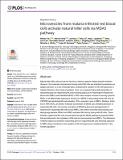Microvesicles from malaria-infected red blood cells activate natural killer cells via MDA5 pathway
Author(s)
Ye, Weijian; Chew, Marvin; Hou, Jue; Lai, Fritz; Leopold, Stije J.; Loo, Hooi Linn; Ghose, Aniruddha; Dutta, Ashok K.; Chen, Qingfeng; Ooi, Eng Eong; White, Nicholas J.; Dondorp, Arjen M.; Preiser, Peter; Chen, Jianzhu; ... Show more Show less
Downloadjournal.ppat.1007298.pdf (4.216Mb)
PUBLISHER_POLICY
Publisher Policy
Article is made available in accordance with the publisher's policy and may be subject to US copyright law. Please refer to the publisher's site for terms of use.
Terms of use
Metadata
Show full item recordAbstract
Natural killer (NK) cells provide the first line of defense against malaria parasite infection. However, the molecular mechanisms through which NK cells are activated by parasites are largely unknown, so is the molecular basis underlying the variation in NK cell responses to malaria infection in the human population. Here, we compared transcriptional profiles of responding and non-responding NK cells following exposure to Plasmodium-infected red blood cells (iRBCs) and identified MDA5, a RIG-I-like receptor involved in sensing cytosolic RNAs, to be differentially expressed. Knockout of MDA5 in responding human NK cells by CRISPR/cas9 abolished NK cell activation, IFN-γ secretion, lysis of iRBCs. Similarly, inhibition of TBK1/IKKε, an effector molecule downstream of MDA5, also inhibited activation of responding NK cells. Conversely, activation of MDA5 by liposome-packaged poly I:C restored non-responding NK cells to lyse iRBCs. We further show that microvesicles containing large parasite RNAs from iRBCs activated NK cells by fusing with NK cells. These findings suggest that NK cells are activated through the MDA5 pathway by parasite RNAs that are delivered to the cytoplasm of NK cells by microvesicles from iRBCs. The difference in MDA5 expression between responding and non-responding NK cells following exposure to iRBCs likely contributes to the variation in NK cell responses to malaria infection in the human population.
Date issued
2018-10Department
Massachusetts Institute of Technology. Department of Biology; Massachusetts Institute of Technology. Department of ChemistryJournal
PLOS Pathogens
Publisher
Public Library of Science
Citation
Ye, Weijian, Marvin Chew, Jue Hou, Fritz Lai, Stije J. Leopold, Hooi Linn Loo, Aniruddha Ghose, et al. “Microvesicles from Malaria-Infected Red Blood Cells Activate Natural Killer Cells via MDA5 Pathway.” Edited by Martin Goodier. PLOS Pathogens 14, no. 10 (October 4, 2018): e1007298.
Version: Final published version
ISSN
1553-7374